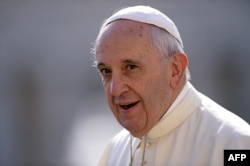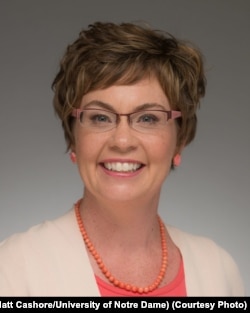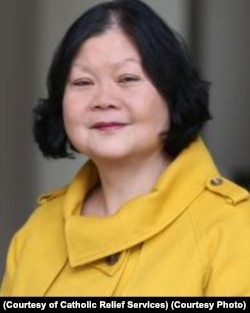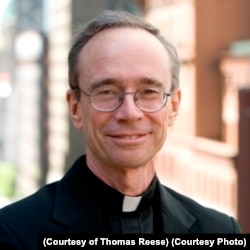Just what is in store for Roman Catholic women under Pope Francis' leadership?
For now, that remains a mystery of the faith.
The pontiff arrived Tuesday for a six-day visit to the United States, trying to shore up support for an American church whose numbers are trailing population growth. Polls show most of the country’s 51 million Catholic adults embrace Francis but disagree with some fundamental church teachings affecting women, who make up just over half of the denomination. Key areas of contention involve women's reproductive health and females' limited roles in the church’s male-dominated hierarchy.
Shortly after becoming pope in March 2013, Francis called for "still broader opportunities for a more incisive female presence" – but made clear women priests would not be accepted anytime soon. Nor has he pushed for women's broader inclusion in positions of authority throughout the church, some Vatican observers say.
"The optimism that I felt two years ago ... has not really been borne out by anything that has happened," said Kathleen Sprows Cummings, director of the University of Notre Dame’s Cushwa Center for the Study of American Catholicism. While she noted the pope appointed a woman to lead a Vatican missionary group and chose five others for an international theological commission, "it’s not the sweeping changes that signal women have a place at the table."
"The bottom line is if women ... are turned off by the church’s patriarchal culture, we’re going to lose future generations," agreed Thomas J. Reese, a Jesuit and member of the U.S. Commission on International Religious Freedom.
Access through altar service
Cummings, a historian, teaches a course on feminism in the church. The young women in her classes don’t necessarily consider themselves feminists, she said, but, having grown up in contemporary America, they "assume all doors are open to them."
Her students wrote letters of protest several years ago when they learned of threats to revoke the right for girls to serve on the altar. The Vatican has permitted female servers since at least 1994 at the discretion of each diocese and their individual priests.
Just outside of Washington, in Arlington, Virginia, 15-year-old Annemarie Dougherty in January became one of the first female servers at St. Agnes Catholic Church. (The Arlington diocese was one of the last to approve female servers, in 2007.)
"A lot of it was that girls weren’t allowed to do what boys were allowed to do, and that frustrated me," the high school sophomore said. Serving on the altar has "made me more aware of what is going on in different parts of the Mass."
Her mother had encouraged Annemarie’s participation. "When I was young, I always thought it was a little unfair. I felt that women were so unimportant in the church," Sheila Dougherty explained. "You had those priests up there, the men doing the readings, the men collecting the money."
The latter two roles, and others, have long since opened up to women. Now both mother and daughter are enthusiastic about the Catholic Church and its spiritual leader.
"The new pope – he’s so cool," Annemarie Dougherty said.
About Francis
He’s also a 78-year-old celibate man, which may impede his understanding of women – and their expectations and potential within the faith community, Reese speculated.
"Celibacy is a problem for priests not because they don’t have sex. It’s because they don’t have a wife" or daughters to question their assumptions and give advice, said Reese, who, as senior analyst for the National Catholic Reporter, has written about the pope and women. He noted that the former Jorge Bergoglio comes from Argentina, and "the Latin American male ideal is macho, paternalistic. You can’t ignore that."
But on the flip side, Reese pointed out, Francis has a long history of working well for and with women – first as a chemist, later as "a leader in the movement against human trafficking" in a country that has had a female president since 2007.
As pope, he has said "the church needs a new theology about women," Reese added. Francis has "invited the church into a conversation. That’s the important thing."
US discussion points
On his U.S. trip, the pontiff might expect discussion on several points of particular interest to women.
Sexual reproduction: Three-fourths (76 percent) of U.S. Catholics differ with, or disregard, the church’s ban on the use of artificial contraception, according to the nonpartisan Pew Research Center.
And a slim majority of U.S. Catholics (51 percent) say abortion should be legal in all or most cases, the Public Religion Research Institute found in a recent poll. That percentage falls to 35 percent among regular churchgoers.
Francis recently announced a special Holy Year of Mercy, in which any priest can grant women forgiveness for abortion, considered a grave sin by the church. The observation begins December 8, a holy day honoring belief in the Virgin Mary’s immaculate conception of Jesus.
The pope, who spent years working among Argentina’s poor and talking with people at every level of society, wrote a letter urging compassion for "all the women who have resorted to abortion. I am well aware of the pressure that has led them to this decision. I know that it is an existential and moral ordeal."
Pushing for priesthood: Nearly six in 10 Catholics support letting women into the priesthood, a Pew Research Center poll found this spring. Francis and his Vatican predecessors have emphatically ruled that out.
But the international Association of Roman Catholic Women Priests claims at least 124 ordained members worldwide, including dozens in the United States. (With ordination comes excommunication by the Vatican.) And it plans to ordain three women bishops in Philadelphia on Thursday, just days before Francis arrives there. "We use equal rites to promote equal rights and justice for women in the church," its website says.
Rebecca Woodhull, president of the National Council of Catholic Women, rejects the association members’ claims of authority. She recently told NPR News: "They are not Catholic priests. They can call themselves that, but it would be, maybe, with a small 'c' and not a capital 'C.'"
Clash with American nuns: Under Pope Benedict XVI, the Vatican’s doctrinal office in 2012 announced it was imposing new oversight of the main leadership representing most of America’s 50,000 nuns after opening an investigation into the sisters’ activities four years earlier.
In a critical report, the office accused the Leadership Conference of Women Religious of devoting too much energy to social justice and too little to countering abortion, euthanasia and gay marriage. It charged that the conference had pushed “radical feminist themes incompatible with the Catholic faith.”
The takeover infuriated many American Catholics, who defended the nuns in letters and protests. "Vatican: First Clean Up Your Own Backyard Before Mowing Down the Nuns,” read a sign at a demonstration in Kansas City, Missouri. The Catholic lobby NETWORK staged a seven-state Nuns on the Bus tour to drive home the importance of sisters' efforts to fight poverty and inequality, including aiding immigrants, the imprisoned and oppressed.
The Vatican and LCWR made peace last April, sending out a joint statement that they had resolved their differences and returned control of the LCWR to the nuns. And in a gesture of support, Francis invited four of the group's leaders to meet with him in Rome.
"It's a wonderful, affirming message from Pope Francis that we're really about the gospel," the LCWR's past president, Sharon Holland, told VOA by phone from Monroe, Michigan, home base for the Servants of Immaculate Heart of Mary. The sister noted it’s one of many religious orders founded with a vision toward helping the poor and marginalized.
Women’s roles in the church
Holland wasn't at the meeting with the pope. But the retired Catholic canon lawyer served until 2009 as an official of the Vatican’s Congregation for Religious. Asked whether women should have access to higher office in the church, Holland said she’d "heard expression of desire for that in Rome – from pretty high up."
"Certainly, there’s a lot of positions that can be filled by women," Holland continued. "… Unfortunately, parishes and dioceses have been cutting back staff" because of financial difficulties.
Holland said she’s less concerned with titles and structure, more about function. She called for collaboration between the sexes but said she thinks women are especially suited to work "in some of those very sensitive areas, [with] refugees, trafficking, immigration. To me, that’s more important than having power."
Power and leadership
Women may not have top roles in the church, but they run three of the largest U.S.-based social service organizations affiliated with it: Catholic Charities USA, the Catholic Health Association and the international charity Catholic Relief Services.
The last is headed by Carolyn Woo. Raised in a Chinese family in Hong Kong and educated by American missionary Maryknoll Sisters, she "grew up in an ecology where men pretty much have the formal power. It doesn’t mean that women don't," she said. The experiences prepared her to become the rare woman leading a university business school – at Notre Dame in Indiana – in 1997 and then the charity in 2012.
Women, including a few religious, fill many of the organization’s top ranks, just as they do at many Catholic hospitals, universities, parish and diocesan schools and parish operations, Woo said. "I think that the glass ceiling is not as strong as people think."
"Where I think the pope has done the most work is on the mindset" to accommodate women, she added.
Nonetheless, Woo urged the church "to have more explicit and targeted focus on women" by increasing its global support for their education and economic development. That, in turn, would improve the well-being of children, families and society.
In many countries, "not only do women take care of their children, their households, they also take care of the fields," said Woo, who was invited to speak in Rome upon the June release of Francis' encyclical on the environment. At the relief agency she runs, "we are very aware of the lack of access by women to proper training, to the tools, to the seed."
Cummings, the Notre Dame historian, praised decisions to put women in charge of the big three Catholic agencies but said, “Along with the big symbolic appointments, you have to appoint women at every level to have real power…. There are so many roles that women could play that don’t require ordination – at pontifical universities, the diocesan level, in the Curia."
Reese, the Jesuit theologian, also urged Francis to "get women into high positions in the Vatican" and throughout the Catholic pipeline.
He said that because women – as mothers, teachers and catechists – primarily pass along each generation’s religious values and traditions, "it's absolutely crucial that the church get this right. The church cannot survive without women."











